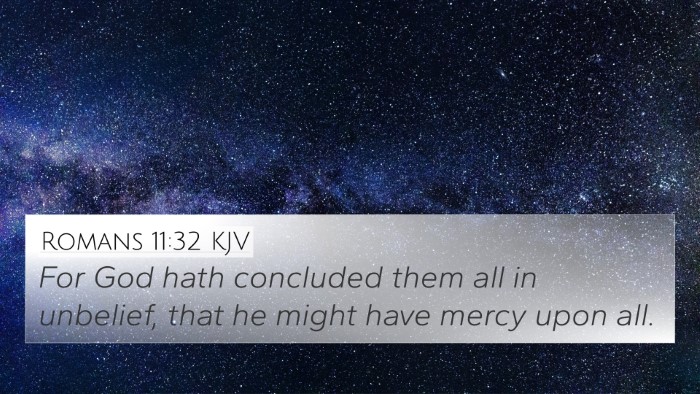Understanding Romans 3:23
Romans 3:23 states: "For all have sinned and fall short of the glory of God." This powerful verse encapsulates the core message of human sinfulness and the need for divine grace. Below, we explore the verse's significance through insights from renowned public domain commentaries.
Summary of Biblical Meaning
In Romans 3:23, the Apostle Paul emphasizes the universality of sin among all humans. This was a critical point in his argument within the larger context of the letter to the Romans, where he discusses righteousness, faith, and salvation.
According to Matthew Henry, the concept of 'sin' as mentioned here refers not only to specific acts of wrongdoing but also to the inherent condition of humanity which estranges us from God. Henry suggests that the phrase "fall short of the glory of God" signifies the inherent inability of humans to attain the perfect righteousness that God requires.
Albert Barnes interprets this verse to highlight that both Jews and Gentiles are guilty before God. His commentary stresses the inclusivity of the term 'all', which means that no one is exempt from this condition of sinfulness, reinforcing the necessity of redemption through Jesus Christ.
Adam Clarke expands on this theme by discussing the implications of 'falling short'. He suggests that this is not merely a moral failure but an existential one, where humanity is separated from God’s glory, which represents His holiness, majesty, and perfection.
Bible Cross-References
This verse connects with several other scriptures, reinforcing its message about sin and the need for salvation:
- Ecclesiastes 7:20 - "Indeed, there is no one on earth who is righteous, no one who does what is right and never sins."
- Isaiah 53:6 - "We all, like sheep, have gone astray, each of us has turned to our own way; and the LORD has laid on him the iniquity of us all."
- 1 John 1:8 - "If we claim to be without sin, we deceive ourselves and the truth is not in us."
- Galatians 3:22 - "But the Scripture declares that the whole world is a prisoner of sin, so that what was promised, being given through faith in Jesus Christ, might be given to those who believe."
- Titus 3:5 - "He saved us, not because of righteous things we had done, but because of his mercy."
- Ephesians 2:1 - "As for you, you were dead in your transgressions and sins."
- Romans 6:23 - "For the wages of sin is death, but the gift of God is eternal life in Christ Jesus our Lord."
- John 3:16 - "For God so loved the world that he gave his one and only Son, that whoever believes in Him shall not perish but have eternal life."
- Psalm 14:3 - "All have turned aside, together they have become corrupt; there is no one who does good, not even one."
- Romans 5:12 - "Therefore, just as sin entered the world through one man, and death through sin, and in this way death came to all people, because all sinned."
Thematic Connections
The themes found in Romans 3:23 resonate throughout the Scriptures, especially regarding human nature and God's redemptive plan. The comprehensive nature of sin, as identified in this verse, echoes in the Old Testament acknowledgment of human failure, exemplified in passages like Isaiah 53:6.
Moreover, the idea of falling short connects to the New Testament's portrayal of the insufficiency of the law to save, found in Galatians 3:22. This creates a thematic bridge linking the Old Testament's prophetic warnings about sin and the New Testament's realization of salvation through faith in Christ.
Cross-Referencing Biblical Texts
Understanding Romans 3:23 in light of other scriptures allows for deeper analysis and appreciation of biblical messages. Here’s how this verse can serve as a reference point for exploring themes of sin, grace, and redemption:
- How to find cross-references in the Bible: Utilize a Bible concordance to identify sin-related verses, such as those connected to Romans 3:23.
- Comparative study of Pauline epistles: This verse can be compared with Paul’s other letters, particularly in discussing the sinful nature of humanity.
- Cross-referencing Psalms with New Testament teachings: The recognition of sin is prevalent in both the Psalms and Paul's letters, offering insight into the consistency of God's message.
- Bible cross-reference guide: A detailed guide will assist in exploring how Romans 3:23 links to salvation narratives across the scriptures.
- Detailed cross-reference between Gospels: Examine how each Gospel presents the need for salvation in light of sin.
- Identifying connections between Old and New Testament: Explore how Old Testament teachings on sin lead into the New Testament revelation of Jesus as Savior.
- Bible verses that support Romans 3:23: Analyze supporting verses that affirm the view of universal sinfulness.
- Cross-reference Bible study methods: Implement methods to study the interconnectedness of biblical texts surrounding sin and grace.
- Bible reference resources: Utilize resources that compile verses about sin, enriching your understanding of Romans 3:23.
- Interpreting Biblical themes through cross-references: Engage with themes of redemption and grace found throughout the Bible through the lens of Romans 3:23.
User Intent Keywords
Many readers seek to understand how various Bible verses interrelate. Thus, they may ask:
- What verses are related to Romans 3:23?
- Find cross-references for specific themes found in this verse.
- How do Romans 3:23 and Ephesians 2:8-9 connect regarding salvation?
- What are the similarities between Romans 3:23 and 1 John 1:8?
- What Bible verses support the idea of falling short of God's glory?
Conclusion
Romans 3:23 is a cornerstone for understanding the doctrine of sin within Christian theology. By utilizing tools for Bible cross-referencing and recognizing the inter-Biblical dialogue, readers can delve deeper into the significance of this verse and its implications for the message of grace through faith. As we see, the connections between the various scriptures weave a rich tapestry that illustrates God's redemptive purposes amidst human folly.
















